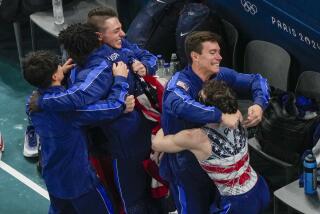THE OLYMPICS / WINTER GAMES AT ALBERTVILLE : Hockey Tradition Continues as Unified Team Wins Gold
- Share via
MERIBEL, France — They respectfully watched a flag that wasn’t theirs rise to the rafters of the Olympic Arena, listening to an anthem whose words they didn’t know.
But even though their victory was honored by the raising of the Olympic flag and the playing of the Olympic anthem, the gold medals worn around the necks of the hockey players on the Unified Team Sunday were indisputably theirs after a 3-1 victory over Canada that gave the former Soviet Union its eighth hockey gold medal in the last 10 tournaments.
“I felt the kind of joy I haven’t experienced for a long time,” Coach Viktor Tikhonov said after his third successive Olympic championship. His team won the silver medal at Lake Placid.
No longer able to keep his team together for year-round training because some players are permitted to play in European professional leagues--and unable to keep some at all after they ventured to the NHL--Tikhonov no longer wielded the power that brought him the nickname “the Czar.” He had to restructure his program and earn his players’ devotion instead of demanding it.
“We had to make corrections in our hockey program because so many players have left our country to play professional hockey. In order to get reserves, we had to do a lot of work,” Tikhonov said through a translator.
“The level of play and class of play is a little different in this tournament, and myself and (his assistants) were a little worried as far as the result of the tournament. We have many new players with the team and we didn’t know how they would perform. There was some question. We are quite satisfied with the way the team has performed.”
The Unified Team (7-1) and Canada (6-2) were scoreless through two periods Sunday. But 61 seconds into the third period, Viacheslav Butsaev scored off of the rebound of a shot Evgeny Davydov banged off the end boards to the right of goaltender Sean Burke.
After Canada failed to capitalize on a five-on-three power play midway through the period, the Unified Team took a 2-0 lead at 15:54 on Igor Boldin’s wrist shot from the right side.
“We came out and did what we wanted to do, which was keep ourselves in the game for the first two periods and try to win it in the third,” Burke said after the Canadians accepted their silver medals, Canada’s first Olympic hockey honors since a bronze-medal finish in 1968 at Grenoble, France.
“In the third, they were a little too strong for us,” added Burke, whose team’s only other losses were to the Unified Team Sunday and a 5-4 preliminary round defeat Feb. 16.
“It was a tight-checking game right to the very end. I have to say they deserved to win . . . you need 21 guys playing the best game of their lives to beat them. We came close to doing that.”
Chris Lindberg made the score 2-1 at 17:20, when he lifted a shot over a prone Mikhail Shtalenkov, but Viacheslav Bykov scored at 18:51.
“They played very well,” Canadian center Eric Lindros said. “We thought their defensemen might be a little young and we could pick on them, but it didn’t work out that way.”
Canada is 1-8 against the Soviet Union and Unified Team in the Olympics, having been outscored, 38-19. Its only victory over the Soviet Union was by 8-5 at Squaw Valley in 1960; in 1936, it routed the then-independent Latvia, 11-0. “We can hold our heads high and still be proud of our performance in the tournament,” Canadian captain Brad Schlegel said.
So can the UnifiedTeam.
“We are very happy with the gold medal,” said Bykov, whose team’s only loss was by 4-3 to the Czech bronze medalists on Feb. 12.
“I was singing the anthem of Russia. We played for the people of Russia.”
“This is a unified team, but I think this is a Russian team. We have two Ukranians (and Darius Kasparaitis of Lithuania) but on the ice, there are no different nationalities.”
This team’s youth distinguishes it from its predecessors.
“I felt in the 1984 Olympics, when they had (Viacheslav) Fetisov, (Alexei) Kasatonov, (Vladimir) Krutov, (Igor) Larionov and (Sergei) Makarov, they were at their peak, but this is also a fine team,” Canadian Coach Dave King said.
“It’s a team that’s got a lot of very young players. A lot of these players haven’t finished their development.
“The other teams were older and couldn’t get much better than they were. This team will improve. If this team can be kept together, it could be a dominating team for a long time.”
Already, however, its dispersal is being planned. Tikhonov said he would allow two or three players to leave for European leagues or the NHL, and Bykov said he and linemate Andrei Khomutov probably won’t be back for the next Olympics.
“At the beginning of the tournament, we weren’t favorites,” Tikhonov said. “Maybe that brought confidence to our players. During the whole tournament, game to game, we managed to improve the style of our play. Right now, our performance is up to the mark.”
More to Read
Go beyond the scoreboard
Get the latest on L.A.'s teams in the daily Sports Report newsletter.
You may occasionally receive promotional content from the Los Angeles Times.







